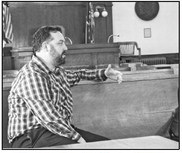Expanding county committees was the right move
The Taylor County board made the right move on Tuesday when supervisors voted to increase the size of a number of county committees with the intent of increasing board member participation in decision making.
Taylor County has, by design, historically been a very decentralized county. The entire county board typically meets as a group only a handful of times during the year and the vast majority of operational decisions are made at the committee level. Often these decisions have significant policy implications for the entire county.
With relatively few county board members serving on any one committee, this has opened the board and its leadership to criticism over excluding board members from the decision making process. This was further exacerbated by an apparent inequality in committee appointments with those in county leadership positions serving on multiple of the most active county committees.
Faced with that criticism from within the ranks of county board members and the turnover of nearly 25% of the county board seats in the last election, board members came into Tuesday’s reorganization meeting with the intent to stir up the status quo.
Significant changes included increasing the size of three remaining three-member committees to five members each as well as increasing the size and representation of the county’s veterans service committee which oversees the veterans service office to have five county board members and two citizen lay members who are military veterans.
For the veterans service committee, the members of the county’s committee on committees and rules intentionally worked to bring greater diversity and representation in face of veterans concerns. The new committee includes three women members (supervisors Lorie Floyd, Sue Swiantek and Marine Corps veteran Catherine Lemke). The addition of lay members to the board was likewise a good move to ensure that veterans concerns are being addressed while the county works to manage the office in the context of overall county operations.
Perhaps the most significant change for the longterm is the merger of the county’s finance and personnel committees to form a single, seven-member committee to handle both finance and personnel issues. This committee also has tasks such as drafting the county’s annual budget and reviewing the county’s insurance policies.
Because of how these committees were set up in the past, there was often significant overlap between the two committees. Most recently, three of the five finance previous committee members also served on personnel creating an automatic majority when the two groups met jointly for major decisions.
The creation of the seven-member committee ensures greater involvement from other county board members allowing additional voices to be heard and constituencies represented.
As with anything, the new system is not perfect. Supervisor Mike Bub is correct in noting the city of Medford despite having the largest tax base of any community is not directly represented on the finance and personnel committee. That said, overall the changes made will be a positive step forward.
The next step for the county will be to address operational issues with staff members and develop a formalized organizational chart providing county employees with a clear chain of command. This would work to eliminate confusion and the tendency for a decentralized administration to fracture into competing “princedoms” forgetting that at the end of the day, they all share a common mission to serve the residents and taxpayers of Taylor County.
Good job county board on increasing the amount of voices that weigh in on decisions and showing that democracy remains strong at the local level.




